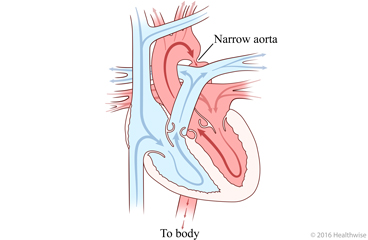Learning About Mild Coarctation of the Aorta in Newborns
What is coarctation of the aorta?

Coarctation of the aorta is a type of congenital heart disease. Congenital heart disease refers to heart
problems a baby is born with.
The aorta is the large blood vessel that sends oxygen-rich blood (red blood) from the heart out to the body.
Coarctation (say "ko-ark-TAY-shun") means that a section of this blood vessel is narrowed or pinched. The
heart has to work extra hard to pump the blood through it.
Coarctation of the aorta makes it harder for the heart to pump blood to the body. Over time, this can lead to
high blood pressure, heart failure, or other problems.
It can be scary to learn that there is something wrong with your baby's heart. The hospital staff understands
this. They will explain what happens and will answer your questions.
How is coarctation of the aorta diagnosed?
Your doctor may hear abnormal heart sounds, such as a heart murmur, when examining your newborn.
Your doctor will order tests to find the cause of abnormal sounds or of symptoms. The most common test used
to find this problem is called an echocardiogram, or "echo" for short. It uses sound waves to make an image of
your baby's heart.
Your baby may have other tests, such as an EKG (electrocardiogram) or a chest X-ray. Another test may look at
the amount of oxygen in the blood.
What are the symptoms?
In mild cases, there may be no symptoms.
If the narrowing is more severe, symptoms may include:
How is it treated?
Mild cases may not cause problems and may not need treatment right away.
When your child is older, or if the narrowing starts to cause problems, a procedure or surgery may be done to
repair the aorta.
What can you expect?
Your doctor will make sure that you have all the information you need to take care of your baby at home.
Regular checkups will help your doctor watch your baby for symptoms over time.
Follow-up care is a key part of your child's treatment and safety. Be sure to make and go to all
appointments, and call your doctor if your child is having problems. It's also a good idea to know your
child's test results and keep a list of the medicines your child takes.
Current as of: June 24, 2023
Content Version: 14.0
Care instructions adapted under license by your
healthcare professional. If you have questions about a medical condition or this instruction, always ask
your healthcare professional. Healthwise, Incorporated disclaims any warranty or liability for your use of
this information.